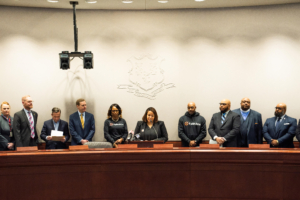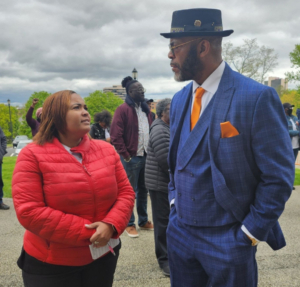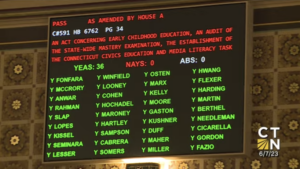As I reflect on the 2023 legislative session, it was incredible to see legislators prioritize educational equity. At the beginning of the year, ConnCAN set out to achieve three policy priorities on the heels of troubling NAEP scores showing significant declines for all students, especially students of color and English Learners.

Our goals centered on providing students access to much needed resources for successful learning, access to educators that reflect the diversity of the state, and access to an interpreter for students for whom English is a second language.
For the first time ever, all three of ConnCAN’s policy priorities passed into law! While this was one of the most challenging sessions yet, our advocacy ensured that students were at the center of all conversations. ConnCAN leads with equity and our work will have a significant impact on students who need the greatest support to reach their potential.
ConnCAN was a central player in advocating for substantive changes to our education funding system, access to educational opportunities for our highest-need communities – including English Learners – and continued progress on educator diversity.
In January, the legislature made clear that education was a top priority, and in large part, they followed through. While the road was anything but smooth, narrative changes began to form as leaders acknowledged greater need for improved student outcomes, oversight and transparency.
ConnCAN achieved all three of its policy priorities, making significant progress at every level. The work is far from over, but there’s a palpable sense that Connecticut can tackle large issues of educational inequity when legislative leaders are focused on solving deep, persistent problems.
Here’s how ConnCAN achieved its top priorities:
Student-Centered Education Funding
Connecticut made the single largest investment in its K-12 education system. The budget pledged to continue the planned Education Cost Sharing formula phase-in and committed an additional $150,000,000 to get us on track for full funding in 2026.

Charter schools received a weighted phase-in of their funding and received funding for two new schools in Norwalk and New Haven/Hamden. Middletown and Danbury charter schools were left out of the budget, largely for political reasons, and we’ll continue to advocate for family options across the state in future years.
Magnet schools received a sizable boost to their funding, meaning that many students in our urban centers will have greater access to funds necessary to attend the school of their choice. Notably, vocational-agricultural schools received their largest increase ever, too. Our state needs farmers for the food security of our future and these programs are highly popular throughout the state.
Importantly, the additional $150,000,000 ConnCAN fought for will go to every student at every school type in every corner of the state. This impact will be felt universally. It is transformative and we couldn’t have gotten here without our coalition partners: School + State Finance Project, FaithActs for Education, CT Charter School Association and Educators for Excellence – CT.
Educator Diversity

For years, ConnCAN has focused on increasing the diversity of our educator workforce. We know that it makes an impact on the trajectory of our students, especially young people of color. This year, ConnCAN successfully advocated for a $14,000,000 investment in a new Aspiring Diverse Educator Scholarship. The new program provides up to $20,000 per diverse student attending a post-secondary teacher preparation program. This means that students will graduate college with little to no debt, catapulting their careers and buying power while teaching.
ConnCAN worked with the leadership of the education committee to author a new Adjunct Professor teaching certificate program. This allows current adjunct professors to teach college and career coursework at our high schools. This is a win-win as it supports students to learn from current college professors and it alleviates shortages in hard to staff areas.
Finally, ConnCAN, in partnership with the State Department of Education, advocated for oversight and transparency for districts to submit their Increasing Diversity Plans. These plans will outline how districts plan to increase their educator diversity, and provide greater oversight through the State Department of Education.
English Learner Bill of Rights

English Learners are the lowest performing population in Connecticut. We sought to make improvements to their educational experience through better communication between school and home. To do this, families must understand their rights, feel safe, and receive vital interpretation services to better support their child’s education. The English Learner Bill of Rights codifies these rights and ensures that families are annually informed in their native language. This breaks down barriers and supports language justice. ConnCAN authored the bill and partnered with Make the Road – CT, United Parents and Students and the Center for Children’s Advocacy. This coalition rallied support from Rep. Felipe, Rep. Candelaria and Governor Lamont, pushing the issue to the forefront of conversations on educational equity.

Overall, ConnCAN made significant strides, pushing for greater investments, options, innovation and transparency. These policy wins provide us with future opportunities to transform our educational system. We will always fight for better student outcomes and ensure that the systems we all rely on are responsive, equitable and fair.
ConnCAN is an organization forged through its relationships with community and leadership. We thank you for your support of our work and we look forward to greater opportunities students ahead.
